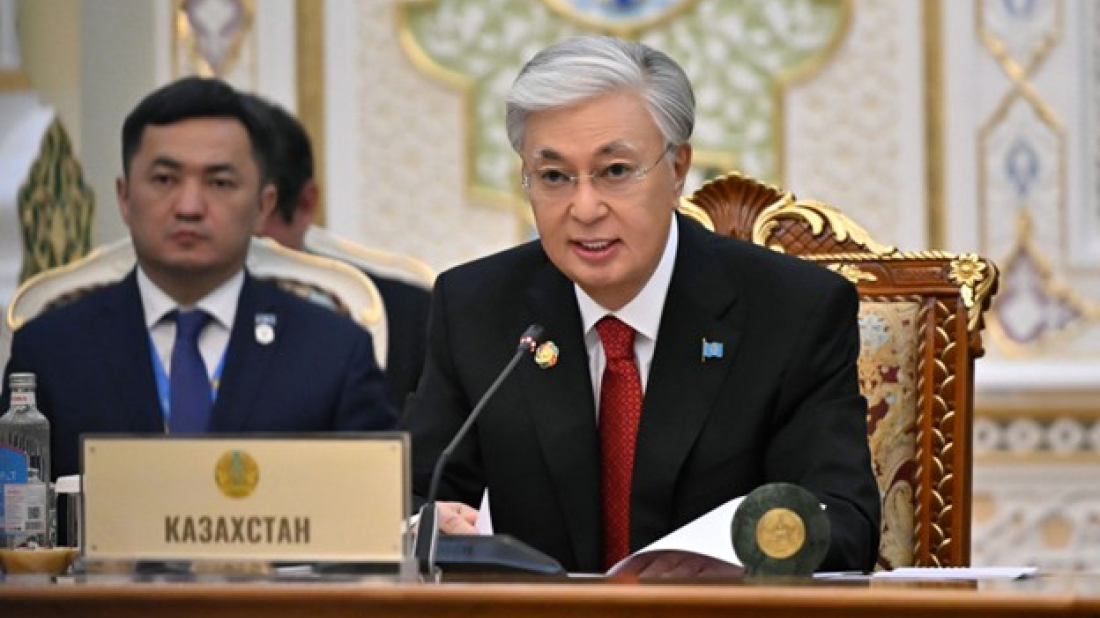Barack Obama condemns Trump ape video shared on Truth Social
Former U.S. President Barack Obama has criticised a video shared by President Donald Trump depicting him and former first lady Michelle Obama as apes,...

President of Kazakhstan Kassym-Jomart Tokayev has called for a joint action between Central Asian countries and Russia to address shrinkage of the Caspian Sea.
Tokayev who made the call during the "Central Asia – Russia" summit urged the countries of the region to unite efforts in tackling pressing environmental issues.
The head of state placed particular emphasis on the preservation of the Caspian Sea’s water resources - one of the region’s key natural arteries.
Tokayev noted that the countries of Central Asia and Russia are currently faced with unprecedented ecological challenges that require a systematic and coordinated approach.
To this end, he proposed the establishment of a Council of Ministers for Environmental Affairs, which would coordinate actions to address transboundary issues.
"Particular attention should be given to the state of transboundary rivers and the Caspian Sea.
The implementation of an Interstate Programme for the Preservation of Caspian Water Resources will contribute to solving this complex problem," the President emphasised.
Tokayev identified water security as one of the most pressing issues in the region, suggesting the use of modern technologies for monitoring and assessing the state of natural resources.
Specifically, he proposed the creation of a joint space monitoring programme based on satellite constellations. This would enable objective assessment of the condition of water resources and agricultural land, as well as forecasting potential emergency situations.
The level of the Caspian Sea has dropped to a historic low - below minus 29 metres according to the Baltic height system.
This figure is the lowest recorded since instrumental observations began. The consequences are especially noticeable in the northern part of the sea, bordering Russia and Kazakhstan, where significant sections of the seabed now lay exposed.
Experts note that a key factor in the drop in the Caspian Sea level is the reduced flow of the Volga River, which accounts for about 80% of all river water entering the sea.
Moreover, it contributes 64% of the total inflow component of the Caspian Sea’s water balance. Specialists also highlight that climate change contribute to the Caspian Sea’s level.
Rising temperatures, driven by increased greenhouse gas concentrations, lead to more intense evaporation from water bodies.
The human factor also plays a role: water is actively extracted from rivers feeding into the Caspian for agricultural, industrial and municipal needs. This further reduces the volume of fresh water reaching the sea.
The shrinkage is especially critical for the northern part of the Caspian, which is characterised by shallow waters and high biological activity. This area contains the most productive zones, rich in living organisms. The reduction of the water area threatens entire ecosystems and may lead to a decline in biodiversity.
U.S. Ambassador to NATO Matthew Whitaker said China has the power to bring an end to Russia’s war in Ukraine, arguing that Beijing is enabling Moscow’s military campaign.
American figure skating star Ilia Malinin endured a dramatic collapse in the men’s free skate on Friday night, falling twice and tumbling out of medal contention at the Milan Cortina Winter Olympics as Kazakhstan’s Mikhail Shaidorov surged to a surprise gold medal.
“Respected and feared globally,” U.S. President Donald Trump told troops at Fort Bragg on Friday (13 February), framing America’s renewed strength against to mounting pressure on Iran amid stalled nuclear talks.
Dubai-based global ports operator DP World said on Friday that its long-serving chairman and chief executive, Sultan Ahmed Bin Sulayem, has stepped down following mounting pressure linked to alleged ties to disgraced financier Jeffrey Epstein.
Speaking at Munich Security Conference, Ukrainian foreign minister Andrii Sybiha calls for decisive steps ahead of expected Geneva talks
Azerbaijani President Ilham Aliyev paid an official visit to Belgrade on Sunday (15 February), which coincides with Serbia’s Statehood Day, lending the visit additional symbolic significance.
At least eleven Palestinians were killed in Israeli airstrikes in the northern and southern Gaza Strip on Sunday (15 February), Palestinian civil defence and health officials said, in what Israel's military called a response to Hamas ceasefire violations.
Israel’s National Guard is preparing to deploy drones capable of firing tear gas at Palestinians in the occupied West Bank, including East Jerusalem, as part of security preparations ahead of the Muslim holy month of Ramadan, Israeli Channel 12 reported on Saturday.
President Ilham Aliyev met with Jared Cohen, President of Global Affairs at The Goldman Sachs Group, Inc., in Munich on 14 February to discuss ongoing cooperation and future partnership opportunities. The meeting took place on the sidelines of the Munich Security Conference 2026.
President of the Republic of Azerbaijan Ilham Aliyev met with Ukrainian President Volodymyr Zelenskyy in Munich on Friday to discuss expanding cooperation between the two countries, officials said. Leaders hold talks on energy, humanitarian aid and bilateral ties.
You can download the AnewZ application from Play Store and the App Store.

What is your opinion on this topic?
Leave the first comment